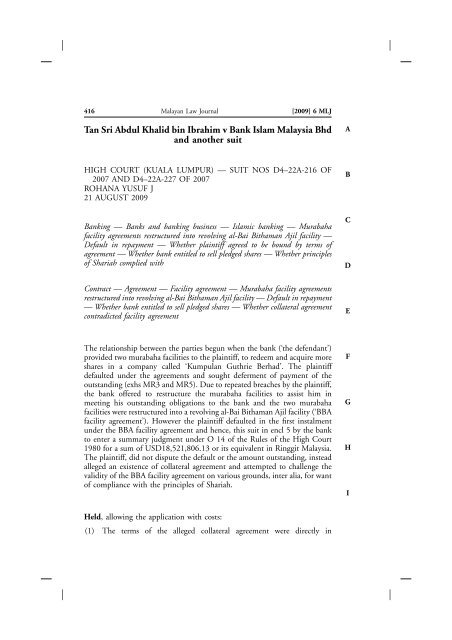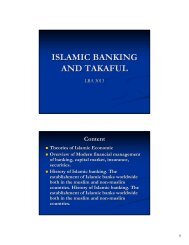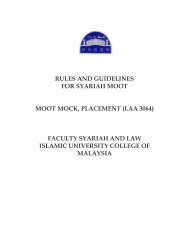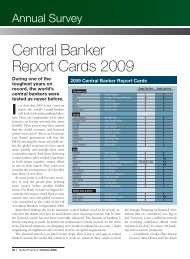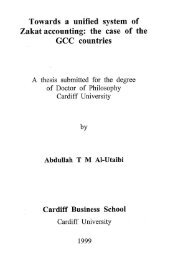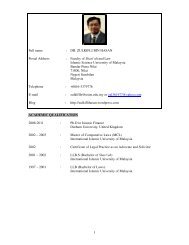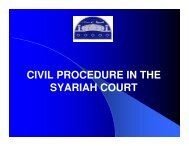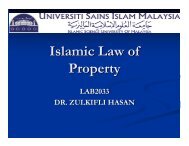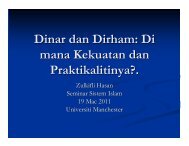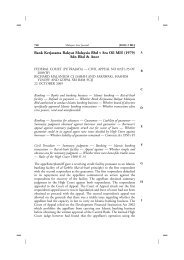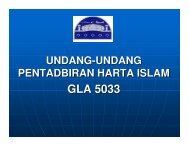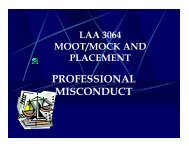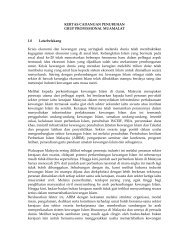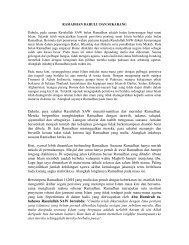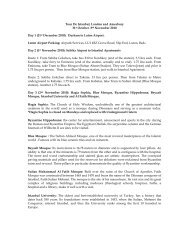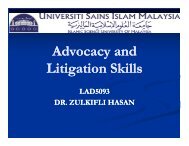Tan Sri Abdul Khalid bin Ibrahim v Bank Islam Malaysia Bhd and ...
Tan Sri Abdul Khalid bin Ibrahim v Bank Islam Malaysia Bhd and ...
Tan Sri Abdul Khalid bin Ibrahim v Bank Islam Malaysia Bhd and ...
Create successful ePaper yourself
Turn your PDF publications into a flip-book with our unique Google optimized e-Paper software.
416 Malayan Law Journal<br />
[2009] 6 MLJ<br />
<strong>Tan</strong> <strong>Sri</strong> <strong>Abdul</strong> <strong>Khalid</strong> <strong>bin</strong> <strong>Ibrahim</strong> v <strong>Bank</strong> <strong>Islam</strong> <strong>Malaysia</strong> <strong>Bhd</strong><br />
<strong>and</strong> another suit<br />
HIGH COURT (KUALA LUMPUR) — SUIT NOS D4–22A-216 OF<br />
2007 AND D4–22A-227 OF 2007<br />
ROHANA YUSUF J<br />
21 AUGUST 2009<br />
<strong>Bank</strong>ing — <strong>Bank</strong>s <strong>and</strong> banking business — <strong>Islam</strong>ic banking — Murabaha<br />
facility agreements restructured into revolving al-Bai Bithaman Ajil facility —<br />
Default in repayment — Whether plaintiff agreed to be bound by terms of<br />
agreement — Whether bank entitled to sell pledged shares — Whether principles<br />
of Shariah complied with<br />
Contract — Agreement — Facility agreement — Murabaha facility agreements<br />
restructured into revolving al-Bai Bithaman Ajil facility — Default in repayment<br />
— Whether bank entitled to sell pledged shares — Whether collateral agreement<br />
contradicted facility agreement<br />
The relationship between the parties begun when the bank (‘the defendant’)<br />
provided two murabaha facilities to the plaintiff, to redeem <strong>and</strong> acquire more<br />
shares in a company called ‘Kumpulan Guthrie Berhad’. The plaintiff<br />
defaulted under the agreements <strong>and</strong> sought deferment of payment of the<br />
outst<strong>and</strong>ing (exhs MR3 <strong>and</strong> MR5). Due to repeated breaches by the plaintiff,<br />
the bank offered to restructure the murabaha facilities to assist him in<br />
meeting his outst<strong>and</strong>ing obligations to the bank <strong>and</strong> the two murabaha<br />
facilities were restructured into a revolving al-Bai Bithaman Ajil facility (‘BBA<br />
facility agreement’). However the plaintiff defaulted in the first instalment<br />
under the BBA facility agreement <strong>and</strong> hence, this suit in encl 5 by the bank<br />
to enter a summary judgment under O 14 of the Rules of the High Court<br />
1980 for a sum of USD18,521,806.13 or its equivalent in Ringgit <strong>Malaysia</strong>.<br />
The plaintiff, did not dispute the default or the amount outst<strong>and</strong>ing, instead<br />
alleged an existence of collateral agreement <strong>and</strong> attempted to challenge the<br />
validity of the BBA facility agreement on various grounds, inter alia, for want<br />
of compliance with the principles of Shariah.<br />
Held, allowing the application with costs:<br />
(1) The terms of the alleged collateral agreement were directly in<br />
A<br />
B<br />
C<br />
D<br />
E<br />
F<br />
G<br />
H<br />
I
A<br />
B<br />
C<br />
D<br />
E<br />
F<br />
G<br />
H<br />
I<br />
<strong>Tan</strong> <strong>Sri</strong> <strong>Abdul</strong> <strong>Khalid</strong> <strong>bin</strong> <strong>Ibrahim</strong> v <strong>Bank</strong> <strong>Islam</strong> <strong>Malaysia</strong> <strong>Bhd</strong><br />
[2009] 6 MLJ <strong>and</strong> another suit (Rohana Yusuf J)<br />
417<br />
contradiction with the terms under the BBA facility agreement. The<br />
allegation of an existence of a collateral agreement by the plaintiff also<br />
seemed implausible in view of the two letters in MR3 <strong>and</strong> MR5 seeking<br />
indulgence from the bank for deferment of payment. The two letters<br />
could not be anything less than admission by the plaintiff of his<br />
liabilities under the murabaha agreements, which had been<br />
restructured. The evidence of negotiations, if any, prior to the<br />
restructuring of the BBA facility agreement were not evidence that the<br />
court could admit in view of ss 91 <strong>and</strong> 92 of the Evidence Act 1950,<br />
as they directly contradicted the express written provisions of the BBA<br />
facility agreement (see para 9).<br />
(2) Questioning of the validity of an agreement after benefiting from it <strong>and</strong><br />
upon default, in itself lacks bona fide as the plaintiff was in the position<br />
to obtain any Shariah or legal advice at the time he entered into the<br />
agreements with the bank. To turn around <strong>and</strong> challenge the validity of<br />
an agreement entered voluntarily after reaping the benefit under it<br />
appeared to be a mere afterthought (see para 13).<br />
(3) Since there were differences in Shariah views, parties may generally<br />
enter into an agreement based on any particular view or opinion <strong>and</strong><br />
they are bound by the contracting terms based on that particular<br />
Shariah position. In this case, the plaintiff had agreed with the bank to<br />
be bound by the BBA terms as per the written terms between them <strong>and</strong><br />
it was not open to him to now say that the BBA terms should have been<br />
interpreted <strong>and</strong> implemented differently. Whilst there is a whole host of<br />
Shariah rule that must be complied with in this transaction, it must be<br />
pointed out that there is another side to fulfilling contractual<br />
obligations in the eyes of the Shariah. The dem<strong>and</strong> on a person to fulfill<br />
contractual obligations in Shariah is an onerous one (see paras 19 &<br />
22); <strong>Bank</strong> Kerjasama Rakyat <strong>Malaysia</strong> Berhad v PSC Naval Dockyard Sdn<br />
<strong>Bhd</strong> [2008] 1 CLJ 745 followed.<br />
(4) There was no clause in the agreement that required the bank to seek the<br />
plaintiff’s consent to sell the pledged shares neither was there any clause<br />
that the parties were entering into the agreement based on the principle<br />
of ar-Rahnu. What was clear was that the documents were drawn to<br />
grant custody to hold the pledged shares where the bank had full access<br />
<strong>and</strong> authority to sell them to cover outst<strong>and</strong>ing due by the plaintiff (see<br />
para 23).<br />
[Bahasa <strong>Malaysia</strong> summary<br />
Hubungan antara pihak-pihak bermula apabila pihak bank (‘defendan’)<br />
menyediakan dua kemudahan murabaha kepada plaintif, bagi menebus dan<br />
memperoleh lebih banyak saham dalam sebuah syarikat yang dipanggil
418 Malayan Law Journal<br />
[2009] 6 MLJ<br />
‘Kumpulan Guthrie Berhad’. Plaintif mungkir di bawah perjanjian-perjanjian<br />
tersebut dan meminta penangguhan pembayaran tertunggak (eksh MR3 dan<br />
MR5). Oleh kerana kemungkiran berulang kali oleh plaintif, bank telah<br />
menawarkan untuk menstruktur semula kemudahan-kemudahan murabaha<br />
untuk membantunya dalam memenuhi kewajipan-kewajipan tertunggaknya<br />
kepada bank dan kedua-dua kemudahan murabaha distruktur semula<br />
menjadi satu kemudahan al-Bai Bithaman Ajil (‘perjanjian kemudahan<br />
BBA’). Walau bagaimanapun plaintif gagal dalam pembayaran ansuran<br />
pertama di bawah perjanjian kemudahan BBA tersebut dan oleh itu, guaman<br />
ini dalam lampiran 5 oleh bank untuk memasukkan satu penghakiman terus<br />
di bawah A 14 Kaedah-Kaedah Mahkamah Tinggi 1980 untuk satu jumlah<br />
sebanyak USD18,521,806.13 atau sama nilainya dalam Ringgit <strong>Malaysia</strong>.<br />
Plaintif, tidak mempertikaikan keingkaran atau jumlah yang tertunggak,<br />
sebaliknya mendakwa kewujudan perjanjian kolateral dan mencabar<br />
kesahihan perjanjian kemudahan BBA atas beberapa alasan, antara lain,<br />
ketidakpatuhan dengan prinsip-prinsip Syariah.<br />
Diputuskan, membenarkan permohonan dengan kos:<br />
(1) Terma-terma perjanjian kolateral yang didakwa itu adalah secara<br />
langsung bertentangan dengan syarat-syarat di bawah perjanjian<br />
kemudahan BBA. Dakwaan mengenai kewujudan satu perjanjian<br />
kolateral oleh plaintif juga kelihatan tidak masuk akal mem<strong>and</strong>angkan<br />
dua surat dalam MR3 dan MR5 memohon jasa baik daripada bank<br />
untuk penangguhan pembayaran. Kedua-dua surat itu merupakan<br />
pengakuan plaintif mengenai liabilitinya di bawah perjanjian-perjanjian<br />
murabaha, yang telah distruktur semula. Bukti rundingan-rundingan,<br />
jika ada, sebelum penstrukturan semula perjanjian kemudahan BBA<br />
bukanlah bukti yang mahkamah boleh terima di bawah ss 91 dan 92<br />
Akta Keterangan 1950, kerana ia secara langsung bertentangan dengan<br />
peruntukan-peruntukan bertulis nyata perjanjian kemudahan BBA<br />
(lihat perenggan 9).<br />
(2) Mempersoalkan kesahihan satu perjanjian selepas mendapat faedah<br />
daripadanya dan apabila ingkar, telah hilang ciri bona fide kerana<br />
plaintif boleh memperoleh nasihat Syariah atau perundangan pada<br />
masa dia men<strong>and</strong>atangani perjanjian-perjanjian dengan bank. Untuk<br />
berpatah balik dan mencabar kesahihan satu perjanjian yang<br />
dit<strong>and</strong>atangani secara sukarela selepas memperoleh manfaat<br />
daripadanya kelihatan seperti sesuatu yang difikirkan kemudian<br />
semata-mata (lihat perenggan 13).<br />
(3) Mem<strong>and</strong>angkan terdapat perbezaan dalam pendapat-pendapat Syariah,<br />
pihak-pihak boleh secara umumnya men<strong>and</strong>atangani satu perjanjian<br />
berdasarkan mana-mana p<strong>and</strong>angan atau pendapat tertentu dan mereka<br />
A<br />
B<br />
C<br />
D<br />
E<br />
F<br />
G<br />
H<br />
I
A<br />
B<br />
C<br />
D<br />
E<br />
F<br />
G<br />
H<br />
I<br />
<strong>Tan</strong> <strong>Sri</strong> <strong>Abdul</strong> <strong>Khalid</strong> <strong>bin</strong> <strong>Ibrahim</strong> v <strong>Bank</strong> <strong>Islam</strong> <strong>Malaysia</strong> <strong>Bhd</strong><br />
[2009] 6 MLJ <strong>and</strong> another suit (Rohana Yusuf J)<br />
419<br />
adalah terikat oleh syarat-syarat kontrak berdasarkan p<strong>and</strong>angan<br />
Syariah tersebut. Dalam kes ini, plaintif telah bersetuju dengan bank<br />
untuk terikat dengan terma-terma BBA seperti terma-terma bertulis<br />
antara mereka dan sekarang dia tidak boleh mengatakan bahawa<br />
terma-terma BBA seharusnya telah ditafsirkan dan dilaksanakan secara<br />
berbeza. Meskipun terdapat sejumlah besar undang-undang Syariah<br />
yang mesti dipatuhi dalam transaksi ini, ia mesti dinyatakan bahawa<br />
terdapat bahagian lain untuk memenuhi<br />
tanggungjawab-tanggungjawab kontraktual dalam p<strong>and</strong>angan Syariah.<br />
Desakan bagi seseorang untuk memenuhi<br />
tanggungjawab-tanggungjawab kontraktual dalam Syariah adalah<br />
sesuatu yang berat (lihat perenggan 19 & 22); <strong>Bank</strong> Kerjasama Rakyat<br />
<strong>Malaysia</strong> Berhad v PSC Naval Dockyard Sdn <strong>Bhd</strong> [2008] 1 CLJ 745<br />
diikut.<br />
(4) Tidak ada klausa di dalam perjanjian tersebut yang memerlukan bank<br />
untuk mendapatkan persetujuan plaintif bagi menjual saham-saham<br />
yang dicagarkan mahupun terdapat sebarang klausa yang pihak-pihak<br />
men<strong>and</strong>atangani perjanjian tersebut berdasarkan prinsip ar-Rahnu. Apa<br />
yang jelas adalah dokumen-dokumen itu telah disediakan bagi memberi<br />
penjagaan untuk memegang saham-saham yang dicagarkan di mana<br />
bank mempunyai akses penuh dan kuasa bagi menjualnya untuk<br />
menampung jumlah tertunggak plaintif (lihat perenggan 23).]<br />
Notes<br />
For cases on facility agreement, see 3(1) Mallal’s Digest (4th Ed, 2006<br />
Reissue) paras 2426–2428.<br />
For cases on <strong>Islam</strong>ic banking, see 1 Mallal’s Digest (4th Ed, 2005 Reissue)<br />
paras 1952–1954.<br />
Cases referred to<br />
Arab-<strong>Malaysia</strong>n Finance <strong>Bhd</strong> v Taman Ihsan Jaya Sdn <strong>Bhd</strong> & Ors (Koperasi Seri<br />
Kota Bukit Cheraka <strong>Bhd</strong>, third party) [2008] 5 MLJ 631; [2009] 1 CLJ<br />
419, HC (refd)<br />
<strong>Bank</strong> <strong>Islam</strong> <strong>Malaysia</strong> v Adnan <strong>bin</strong> Omar [1994] 3 CLJ 735, HC (refd)<br />
<strong>Bank</strong> Kerjasama Rakyat <strong>Malaysia</strong> <strong>Bhd</strong> v Emcee Corporation Sdn <strong>Bhd</strong> [2003] 2<br />
MLJ 408; [2003] 1 CLJ 625, CA (refd)<br />
<strong>Bank</strong> Kerjasama Rakyat <strong>Malaysia</strong> <strong>Bhd</strong> v PSC Naval Dockyard Sdn <strong>Bhd</strong> [2008]<br />
1 CLJ 784, HC (folld)<br />
Ng Hee Thoong & Anor v Public <strong>Bank</strong> <strong>Bhd</strong> [1995] 1 MLJ 281, CA (folld)<br />
Noh Hyoung Seok v Perwira Affin <strong>Bhd</strong> [2004] 2 MLJ 203; [2004] 2 CLJ 64,<br />
CA (refd)<br />
SM Appaduray & Anor v R An<strong>and</strong>a & Anor [1982] 1 MLJ 292, HC (refd)<br />
<strong>Tan</strong> Swee Hoe Co Ltd v Ali Hussain Bros [1980] 2 MLJ 16, FC (refd)
420 Malayan Law Journal<br />
[2009] 6 MLJ<br />
Legislation referred to<br />
Central <strong>Bank</strong> of <strong>Malaysia</strong> Act 1958 s 16B, 16B(2), (7), (8)<br />
Contracts Act 1950 s 24<br />
Evidence Act 1950 ss 91, 92<br />
<strong>Islam</strong>ic <strong>Bank</strong>ing Act 1983 s 2<br />
Rules of the High Court 1980 O 14<br />
Malik Imtiaz Sarwar (Mathew Thomas Philip with him) (Thomas Philip) for<br />
the plaintiff.<br />
Tommy Thomas (Ganesan Nethi with him) (Tommy Thomas) for the defendant.<br />
Rohana Yusuf J:<br />
[1] There are two legal suits involving the parties. One is a claim by <strong>Bank</strong><br />
<strong>Islam</strong> <strong>Malaysia</strong> <strong>Bhd</strong> against <strong>Tan</strong> <strong>Sri</strong> <strong>Abdul</strong> <strong>Khalid</strong> <strong>bin</strong> <strong>Ibrahim</strong> (‘<strong>Tan</strong> <strong>Sri</strong><br />
<strong>Khalid</strong>’) in Suit No D4–22A-227 of 2007 <strong>and</strong> the other is a claim by <strong>Tan</strong> <strong>Sri</strong><br />
<strong>Khalid</strong> against the <strong>Bank</strong> in Suit D4–22A-216 of 2007. Both suits are now<br />
consolidated. Pursuant to Suit No 22A-227 of 2007 this application in encl<br />
5, by <strong>Bank</strong> <strong>Islam</strong> <strong>Malaysia</strong> <strong>Bhd</strong> is made under O 14 of the Rules of the High<br />
Court 1980.<br />
[2] The original parties to the agreements are <strong>Tan</strong> <strong>Sri</strong> <strong>Khalid</strong> <strong>and</strong> <strong>Bank</strong><br />
<strong>Islam</strong> (L) Ltd <strong>Malaysia</strong> <strong>Bhd</strong> vide a vesting order dated 14 February 2006, all<br />
rights <strong>and</strong> obligations of <strong>Bank</strong> <strong>Islam</strong> (L) Ltd were transferred to <strong>and</strong> vested<br />
in <strong>Bank</strong> <strong>Islam</strong> <strong>Malaysia</strong> <strong>Bhd</strong>. Both <strong>Bank</strong> <strong>Islam</strong> (L) Ltd <strong>and</strong> <strong>Bank</strong> <strong>Islam</strong><br />
<strong>Malaysia</strong> <strong>Bhd</strong> will hereafter be referred to interchangeably, as ‘the bank’.<br />
BACKGROUND FACTS<br />
[3] The relationship between the parties begun when the bank provided<br />
two murabaha facilities to <strong>Tan</strong> <strong>Sri</strong> <strong>Khalid</strong>, to redeem <strong>and</strong> acquire more shares<br />
in a company called ‘Kumpulan Guthrie <strong>Bhd</strong>’. <strong>Tan</strong> <strong>Sri</strong> <strong>Khalid</strong> failed to pay<br />
the first instalment under the first murabaha facility agreement which was<br />
due on 24 October 1998. He sought a deferment of payment of the<br />
outst<strong>and</strong>ing vide a letter dated 16 October 1998 (exh MR3). He also<br />
defaulted under the second murabaha agreement when he failed to pay the<br />
first instalment thereunder <strong>and</strong> sought a deferment of payment vide a letter<br />
dated 20 October 1999 (exh MR5).<br />
RESTRUCTURING<br />
[4] Due to repeated breaches by <strong>Tan</strong> <strong>Sri</strong> <strong>Khalid</strong>, the bank offered to<br />
restructure the murabaha facilities to assist him in meeting his outst<strong>and</strong>ing<br />
obligations to the bank. <strong>Tan</strong> <strong>Sri</strong> <strong>Khalid</strong> agreed to the restructuring when he<br />
A<br />
B<br />
C<br />
D<br />
E<br />
F<br />
G<br />
H<br />
I
A<br />
B<br />
C<br />
D<br />
E<br />
F<br />
G<br />
H<br />
I<br />
<strong>Tan</strong> <strong>Sri</strong> <strong>Abdul</strong> <strong>Khalid</strong> <strong>bin</strong> <strong>Ibrahim</strong> v <strong>Bank</strong> <strong>Islam</strong> <strong>Malaysia</strong> <strong>Bhd</strong><br />
[2009] 6 MLJ <strong>and</strong> another suit (Rohana Yusuf J)<br />
421<br />
accepted the offer of the bank dated 17 April 2001 in exh MR6. By that<br />
acceptance, the two murabaha facilities were restructured into a revolving<br />
al-Bai Bithaman Ajil facility (‘BBA facility agreement’). The BBA facility<br />
agreement comprises the following documents:<br />
(a) Letter of offer to restructure murabaha facilities dated 17 April 2001 (in<br />
exh MR6).<br />
(b) Memor<strong>and</strong>um of acceptance by <strong>Tan</strong> <strong>Sri</strong> <strong>Khalid</strong> (in exh MR6).<br />
(c) Master revolving BBA facility (BBA agreement) (in exh MR7).<br />
(d) Memor<strong>and</strong>um of charge over shares dated 30 April 2001 (in exh MR8).<br />
(e) Fund administration <strong>and</strong> custodian agreement (in exh MR9).<br />
The salient terms of the BBA facility agreement are as follows.<br />
(a) The bank purchases from <strong>Tan</strong> <strong>Sri</strong> <strong>Khalid</strong> 39,681.562 shares of<br />
Kumpulan Guthrie (‘Guthrie shares’) for USD56,500,000.<br />
(b) The bank resells the shares to <strong>Tan</strong> <strong>Sri</strong> <strong>Khalid</strong> at a sale price to be<br />
determined on the basis of the cost of funds plus 0.75%.<br />
(c) At every six monthly intervals, the parties will have to execute an asset<br />
sale agreement (‘ASA’) <strong>and</strong> an asset purchase agreement (‘APA’) in<br />
respect of the Guthrie shares in the specified form.<br />
(d) The sale price is to be paid in instalments by <strong>Tan</strong> <strong>Sri</strong> <strong>Khalid</strong>, <strong>and</strong> the<br />
first instalment being payable six months from the date of each asset sale<br />
agreement <strong>and</strong> the second instalment, six months thereafter.<br />
(e) The bank has the m<strong>and</strong>ate <strong>and</strong> absolute discretion to sell all or part of<br />
the Guthrie shares pledged to it as security in satisfaction of sums due.<br />
(f) The bank reserves the right to instruct <strong>Tan</strong> <strong>Sri</strong> <strong>Khalid</strong> to top-up or to<br />
increase the security in respect of the facility at any time.<br />
(g) Default of payment on due dates <strong>and</strong> inadequate security give the bank<br />
the right to declare that the indebtedness is due <strong>and</strong> payable by <strong>Tan</strong> <strong>Sri</strong><br />
<strong>Khalid</strong> <strong>and</strong> to enforce the BBA facility agreement.<br />
[5] <strong>Tan</strong> <strong>Sri</strong> <strong>Khalid</strong> defaulted the first instalment under the restructured<br />
BBA facility agreement <strong>and</strong> hence, this suit. In encl 5, the bank is applying<br />
to enter a summary judgment for a sum of USD18,521,806.13 (as at 13<br />
November 2006) or its equivalent in ringgit <strong>Malaysia</strong>.<br />
[6] <strong>Tan</strong> <strong>Sri</strong> <strong>Khalid</strong> did not dispute the default or the amount outst<strong>and</strong>ing.<br />
He instead, alleged an existence of collateral agreement <strong>and</strong> attempted to
422 Malayan Law Journal<br />
[2009] 6 MLJ<br />
challenge the validity of the BBA facility agreement on various grounds.<br />
COLLATERAL AGREEMENT<br />
[7] First, learned counsel for <strong>Tan</strong> <strong>Sri</strong> <strong>Khalid</strong>, Encik Malik Imtiaz Sarwar<br />
(Encik Matthew Thomas Phillip with him) contends that there exists a<br />
collateral agreement between the parties orally <strong>and</strong> by conduct. He contends<br />
that; it was the intention of the parties to avail <strong>Tan</strong> <strong>Sri</strong> <strong>Khalid</strong> to take up 20%<br />
shares in Guthrie within ten years following an option given to him by<br />
Perbadanan Nasional <strong>Bhd</strong>; that the tenure of BBA facility agreement would<br />
be for a period of ten years <strong>and</strong> the principal amount would only be due for<br />
payment by 2011; the half yearly profits due to the bank under the BBA<br />
facility agreement would be satisfied through the transfer of shares by <strong>Tan</strong> <strong>Sri</strong><br />
<strong>Khalid</strong> to the bank <strong>and</strong> by an allocation of dividends from transferred shares<br />
to the bank to allow the facility to be seen as performing; no payment needed<br />
to be made by <strong>Tan</strong> <strong>Sri</strong> <strong>Khalid</strong> <strong>and</strong> the BBA facility agreement will be rolled<br />
over at the end of every six months as a matter of course. It was also<br />
contended that there was no request made by the bank for <strong>Tan</strong> <strong>Sri</strong> <strong>Khalid</strong> to<br />
top-up securities although the transfer of his shares to the bank had<br />
progressively reduced the security coverage. Finally it was contended that the<br />
relation between parties must be viewed as a partnership of mutual benefit,<br />
in a win-win situation upon the ultimate sale of the Guthrie shares. The BBA<br />
facility agreement must therefore be viewed in the context of all these<br />
collateral promises.<br />
[8] In response, learned counsel for the bank Encik Tommy Thomas (Encik<br />
Ganesan Nethiganantarajah with him) submits that the intention of the<br />
parties are clearly spelled out in the BBA facility agreement <strong>and</strong> parties<br />
entered into these agreements with the intention to be bound by their<br />
respective terms, <strong>and</strong> nothing more. Relying on these terms the bank<br />
disbursed USD56,500,000 to refinance monies owing under the earlier two<br />
murabaha agreements. The bank took a gradual disposal of the pledged shares<br />
to recoup payments in respect of the amount owing to the bank by <strong>Tan</strong> <strong>Sri</strong><br />
<strong>Khalid</strong>. The proceeds of sale of part of the pledged Guthrie shares are shown<br />
in the statement of account in exh MR24. Resulting from this, the amount<br />
of the pledged Guthrie shares had decreased, <strong>and</strong> the bank vide exh MR25<br />
dem<strong>and</strong>ed <strong>Tan</strong> <strong>Sri</strong> <strong>Khalid</strong> to furnish further securities. <strong>Tan</strong> <strong>Sri</strong> <strong>Khalid</strong> failed<br />
to top up. The bank issued notice of 18 July 2005 (in exh MR26) for him<br />
to remedy his default, but received no response. Another notice was issued by<br />
the bank dated 4 August 2005 (in exh MR27) when the first notice was not<br />
complied.<br />
[9] I will now deal with the issue on collateral agreement. I note that the<br />
terms of the alleged collateral agreement are directly in contradiction with the<br />
A<br />
B<br />
C<br />
D<br />
E<br />
F<br />
G<br />
H<br />
I
A<br />
B<br />
C<br />
D<br />
E<br />
F<br />
G<br />
H<br />
I<br />
<strong>Tan</strong> <strong>Sri</strong> <strong>Abdul</strong> <strong>Khalid</strong> <strong>bin</strong> <strong>Ibrahim</strong> v <strong>Bank</strong> <strong>Islam</strong> <strong>Malaysia</strong> <strong>Bhd</strong><br />
[2009] 6 MLJ <strong>and</strong> another suit (Rohana Yusuf J)<br />
423<br />
terms under the BBA facility agreement, though they may have been part of<br />
negotiations prior to the acceptance of restructuring. The allegation of an<br />
existence of a collateral agreement by <strong>Tan</strong> <strong>Sri</strong> <strong>Khalid</strong> also seems implausible<br />
in view of the two letters in MR3 <strong>and</strong> MR5 seeking indulgence from the<br />
bank for deferment of payment. I agree with the contention of Encik Tommy<br />
Thomas that these two letters cannot be anything less than admission by <strong>Tan</strong><br />
<strong>Sri</strong> <strong>Khalid</strong> of his liabilities under the murabaha agreements, which is now<br />
restructured. The evidence of negotiations if any, prior to restructuring of the<br />
BBA facility agreement are not evidence that this court can admit in view of<br />
ss 91 <strong>and</strong> 92 of the Evidence Act 1950, as they directly contradict the<br />
expressed written provisions of the BBA facility agreement.<br />
[10] Under s 91, when the terms of a contract have been reduced to the<br />
form of document, no evidence shall he given to prove the terms of the<br />
contract, except that it should be construed within the four corners of the<br />
document itself. Under s 92, no oral evidence or statement can be admitted<br />
for the purpose of contradicting, varying, adding to or subtracting the written<br />
terms. Encik Malik Imtiaz cites in authority the Federal Court case of <strong>Tan</strong><br />
Swee Hoe Co Ltd v Ali Hussain Bros [1980] 2 MLJ 16, to support his<br />
contention that oral promises can be taken into account, <strong>and</strong> assurances given<br />
in the course of negotiation may give rise to a contractual obligation. In that<br />
same case a question was posed as to why oral promise which parties place so<br />
much importance on are not written into the agreement. In response the<br />
Federal Court acknowledges the need for the law to accommodate the<br />
ordinary people <strong>and</strong> not to expect response of astute businessman in all cases.<br />
However, such leaning in favour of the ignorant or innocent cannot apply in<br />
this case as it is a known fact that <strong>Tan</strong> <strong>Sri</strong> <strong>Khalid</strong> is an experienced <strong>and</strong> astute<br />
businessman. He was then the chief executive officer of Guthrie <strong>Bhd</strong> <strong>and</strong> now<br />
the Menteri Besar of Selangor. It is too preposterous to expect a person of<br />
such st<strong>and</strong>ing to rely on oral promises which contradict the agreements he<br />
signed freely <strong>and</strong> voluntarily. He surely must have understood <strong>and</strong> was fully<br />
aware of the implications of what he signed. This is not an appropriate case<br />
where a party to a contract can be said to have relied on oral promises that<br />
run contradictory to what he has agreed in a written document. To use oral<br />
evidence to contradict his written obligations under an agreement or to allow<br />
extrinsic evidence be used to contradict or avoid obligations under the<br />
written agreements will run foul of s 91 of the Evidence Act. Even if there is<br />
any indulgence granted by the bank, it cannot be interpreted to create a<br />
partnership between them. The allegation of an existence of a collateral<br />
agreement, <strong>and</strong> that he relied upon them in my view are highly improbable,<br />
given the circumstances.<br />
ILLEGALITY<br />
[11] <strong>Tan</strong> <strong>Sri</strong> <strong>Khalid</strong> challenged the validity of the BBA facility agreements
424 Malayan Law Journal<br />
[2009] 6 MLJ<br />
for want of compliance with the principles of Shariah. Encik Malik Imtiaz for<br />
<strong>Tan</strong> <strong>Sri</strong> <strong>Khalid</strong> contends that the BBA facility agreement is contrary to<br />
principles of <strong>Islam</strong> due to the following three main reasons. First, the BBA<br />
facility agreement either read together with the security documents or even<br />
independently will denote that they are financing arrangement <strong>and</strong> not sale<br />
transaction as they purport to be. Secondly, the BBA facility agreement<br />
become ‘bay al-inah’ as the recital of the agreement shows there is connection<br />
between the asset purchase agreement (‘APA’) <strong>and</strong> asset sale agreement<br />
(‘ASA’). Thirdly, the disposal of the pledged Guthrie shares by the bank<br />
without notifying <strong>Tan</strong> <strong>Sri</strong> <strong>Khalid</strong> is contrary to <strong>Islam</strong>ic principle known as<br />
‘al-Rahnu’ which requires consent of pledgees. Consequently he submitted<br />
that the BBA agreement is contrary to law or public policy <strong>and</strong> cannot be<br />
enforced under s 24 of the Contracts Act 1950.<br />
[12] According to him, though being challenged on the Shariah compliant,<br />
the bank did not produce opinion to the contrary nor any approval from the<br />
bank’s Shariah Supervisory Council. He submits that expert opinion is<br />
required to determine the issue at h<strong>and</strong>. He cites the case of SM Appaduray<br />
& Anor v R An<strong>and</strong>a & Anor [1982] 1 MLJ 292. In that case, the learned High<br />
Court judge observed that, where the court is not in a position to form a<br />
correct judgment without the help of persons who have acquired special skill<br />
or experience on a particular subject, the court should not allow summary<br />
judgment. This is because the weight of the expert opinion can only be tested<br />
at a trial as it would be challenged on its accuracy. He produced three Shariah<br />
opinions which essentially raise issues with BBA agreement in the eyes of<br />
Shariah. Such, <strong>and</strong> in view of the complexities of both facts <strong>and</strong> law he<br />
contends that this case merits a trial. This is because under an O 14<br />
application, the court need only consider whether or not there are issues to<br />
be tried but not to delve into their merits as stated in Noh Hyoung Seok v<br />
Perwira Affin <strong>Bhd</strong> [2004] 2 MLJ 203; [2004] 2 CLJ 64. In Ng Hee Thoong<br />
& Anor v Public <strong>Bank</strong> <strong>Bhd</strong> [1995] 1 MLJ 281 it is stated that, since the effect<br />
of O 14 is to shut the defendant from having his day in the witness box it<br />
should only be invoked in cases where there is no bona fide triable issue.<br />
[13] Following the well established principle in Ng Hee Thong it must be<br />
borne in mind that the triable issue raised in resisting an O 14 application<br />
must be bona fide. The issue before me is therefore whether the challenge on<br />
the validity of the BBA facility agreement is a bona fide triable issue. In my<br />
view, questioning of the validity of an agreement after benefiting from it <strong>and</strong><br />
upon default, in itself lacks bona fide. I say this because <strong>Tan</strong> <strong>Sri</strong> <strong>Khalid</strong> was<br />
in the position to obtain any Shariah or legal advice at the time he entered<br />
into these agreements with the bank. To turn around <strong>and</strong> challenge the<br />
validity of an agreement entered voluntarily after reaping the benefit under it<br />
appears to be a mere afterthought. This is also akin to a case of a muslim who<br />
A<br />
B<br />
C<br />
D<br />
E<br />
F<br />
G<br />
H<br />
I
A<br />
B<br />
C<br />
D<br />
E<br />
F<br />
G<br />
H<br />
I<br />
<strong>Tan</strong> <strong>Sri</strong> <strong>Abdul</strong> <strong>Khalid</strong> <strong>bin</strong> <strong>Ibrahim</strong> v <strong>Bank</strong> <strong>Islam</strong> <strong>Malaysia</strong> <strong>Bhd</strong><br />
[2009] 6 MLJ <strong>and</strong> another suit (Rohana Yusuf J)<br />
425<br />
goes into a restaurant, had a meal, only to inquire after the meal if the food<br />
is non-halal <strong>and</strong> when told that is so, refuses to pay for it. Such conduct<br />
cannot reflect a serious concern of the Shariah compliance, but more of an<br />
attempt to renege contractual obligations which have been voluntarily agreed<br />
<strong>and</strong> acted upon by the other party.<br />
[14] Be that as it may, it would be necessary to analyse the issue raised on<br />
this point. Encik Malik Imtiaz submits three Shariah opinions, one by Dr Ugi<br />
Suharto (in exh AK1-16), an Assistant Prof Department of Economics of the<br />
International <strong>Islam</strong>ic University <strong>Malaysia</strong> (IIUM) another, from Dr Aznan<br />
<strong>bin</strong> Hassan, (in exh AK1-55) an Assistant Prof of Kuliyyah of Laws IIUM<br />
<strong>and</strong> another, from Mr Mohd El Faith Hamid (exh MEL1), a fellow<br />
(Professor) at the University of Khartoum. Essentially all these opinions<br />
question the validity of the BBA agreement under the Shariah. Encik Malik<br />
Imtiaz contends that since the BBA agreement is not in line with <strong>Islam</strong>ic law<br />
the BBA agreement is an illegal contract or agreement against public policy<br />
<strong>and</strong> are null <strong>and</strong> void under s 24 of the Contracts Act 1950.<br />
[15] I would like first to appraise myself with the legislative provision that<br />
deals with this issue as found in s 16B of the Central <strong>Bank</strong> of <strong>Malaysia</strong> Act.<br />
Section 16B creates the Shariah Advisory Council (‘SAC’) under the aegis of<br />
the <strong>Bank</strong> Negara <strong>Malaysia</strong> (‘<strong>Bank</strong> Negara’). Section 16B designates the SAC<br />
to be the authority for the ascertainment of <strong>Islam</strong>ic law for the purposes of<br />
<strong>Islam</strong>ic banking business, takaful business or <strong>Islam</strong>ic financial business. <strong>Bank</strong><br />
Negara, under s 16B(7) must consult the SAC on Shariah matters relating to<br />
<strong>Islam</strong>ic banking business, takaful business, <strong>Islam</strong>ic financial business, <strong>Islam</strong>ic<br />
development financial business, or any other business which is based on<br />
Shariah principles. <strong>Bank</strong> Negara, may issue written directives to banks <strong>and</strong><br />
financial institutions in relation to <strong>Islam</strong>ic banking or <strong>Islam</strong>ic financing<br />
businesses in accordance with the advice of the SAC. Its membership as<br />
determined under s 16B(2) is made of members from related disciplines,<br />
besides Shariah scholars. Looking at s 16B(7), I would not be wrong to<br />
assume that when <strong>Bank</strong> Negara issues directives involving Shariah matter it<br />
would have the approval or the advice of the SAC. Thus an approval of <strong>Bank</strong><br />
Negara for financial institutions to offer <strong>Islam</strong>ic banking products would <strong>and</strong><br />
must have had the benefit of the advice of the SAC. I raise this point also<br />
because in the submission of Encik Tommy Thomas for the bank, he<br />
confirmed that the restructuring of this particular BBA facility agreement<br />
received the sanction of <strong>Bank</strong> Negara, which in return would have had the<br />
benefit of the SAC’s advice.<br />
[16] Under s 16B(8), it is provided that in any proceedings before the court<br />
when a question arises concerning a Shariah matter, the court or the<br />
arbitrator may take into consideration any written directives issued pursuant
426 Malayan Law Journal<br />
[2009] 6 MLJ<br />
to sub-s (7) or refer such question to the SAC for its ruling. Relying on this<br />
clause in fact, after the submissions was made before me by both counsel on<br />
the Shariah issue raised; I had caused an enquiry to be made to the SAC as<br />
to whether a ruling has been made on the status of BBA agreement. The<br />
secretariat to SAC responded with a written ruling from the SAC which states<br />
essentially, that BBA agreement is acceptable <strong>and</strong> a recognised transaction in<br />
<strong>Islam</strong>. I have furnished the said written ruling from the SAC to both counsel.<br />
Thereafter, counsel for <strong>Tan</strong> <strong>Sri</strong> <strong>Khalid</strong> in a letter dated 5 May 2009 seeks<br />
leave for a further submission on the Shariah issue. In a further written<br />
submission, learned counsel contends that the mode of execution of APA <strong>and</strong><br />
ASA was improper because <strong>Tan</strong> <strong>Sri</strong> <strong>Khalid</strong> was made to sign both agreements<br />
first before they were passed back to be completed by the bank. There was<br />
therefore no separation of the APA with the ASA <strong>and</strong> no distinction in term<br />
of time of execution as required under the said ruling of the SAC. As such<br />
there was no complete sale of shares to the bank under the APA before the<br />
bank can resell shares to <strong>Tan</strong> <strong>Sri</strong> <strong>Khalid</strong> in the ASA. To my mind, this issue<br />
is based on mere technicality <strong>and</strong> a trivial one. The consensus between parties<br />
has been arrived at the point the letter of offer was accepted by <strong>Tan</strong> <strong>Sri</strong><br />
<strong>Khalid</strong>. The agreement to be bound is subject to the formalities of the<br />
execution of various documents. Signing of the written agreements is to<br />
formalise <strong>and</strong> to translate the consensus of parties in the terms clearly agreed<br />
upon. Besides, it has always been a practice, for the borrower to affix<br />
signatures on all banking documents before the bank execute the same, <strong>and</strong><br />
it is rather inconceivable to suggest that it can affect the validity of the<br />
contract. Furthermore, a written confirmation from the bank’s own Shariah<br />
Council in exh GN4 confirmed that the mode employed for the execution of<br />
the documents in the present case is in order <strong>and</strong> has no bearing from Shariah<br />
perspective. With seven sets of APA <strong>and</strong> ASA documents signed in the same<br />
manner, the parties would have condoned <strong>and</strong> accepted such practice. As<br />
such, I fail to see how these agreements will not be <strong>bin</strong>ding on parties merely<br />
because they are signed without following orders of precedent, when after<br />
entering into the seven sets of transaction the defendant never protests or<br />
raises any issue.<br />
[17] Returning now to the SAC, it is clear from s 16B that the SAC is the<br />
body empowered for the ‘ascertainment of <strong>Islam</strong>ic Law for the purpose of<br />
<strong>Islam</strong>ic banking business…’. The Legislature had intended the SAC to be a<br />
legally recognised body under the law to ascertain the <strong>Islam</strong>ic law applicable<br />
to <strong>Islam</strong>ic banking <strong>and</strong> finance. With such specific legislative provision it is<br />
obvious that the SAC is a body empowered <strong>and</strong> recognised under the<br />
legislation to issue ruling <strong>and</strong> direction on the applicable Shariah law in<br />
<strong>Islam</strong>ic banking business.<br />
A<br />
B<br />
C<br />
D<br />
E<br />
F<br />
G<br />
H<br />
I
A<br />
B<br />
C<br />
D<br />
E<br />
F<br />
G<br />
H<br />
I<br />
<strong>Tan</strong> <strong>Sri</strong> <strong>Abdul</strong> <strong>Khalid</strong> <strong>bin</strong> <strong>Ibrahim</strong> v <strong>Bank</strong> <strong>Islam</strong> <strong>Malaysia</strong> <strong>Bhd</strong><br />
[2009] 6 MLJ <strong>and</strong> another suit (Rohana Yusuf J)<br />
427<br />
[18] To my mind there is good reason for having this body. A ruling made<br />
by a body given legislative authority will provide certainty, which is a much<br />
needed element to ensure business efficacy in a commercial transaction.<br />
Taking cognisance that there will always be differences in views <strong>and</strong> opinions<br />
on the Shariah, particularly in the area of muamalat, there will inevitably be<br />
varied opinions on the same subject. This is mainly due to the permissive<br />
nature of the religion of <strong>Islam</strong> in the area of muamalat. Such permissive<br />
nature is evidenced in the definition of <strong>Islam</strong>ic banking business in s 2 of the<br />
<strong>Islam</strong>ic <strong>Bank</strong>ing Act 1983 itself. <strong>Islam</strong>ic banking business is defined to mean,<br />
banking business whose aims <strong>and</strong> operations do not involve any element which is<br />
not prohibited by the Religion of <strong>Islam</strong>. It is amply clear that this definition is<br />
premised on the doctrine of ‘what is not prohibited will be allowed’. It must be<br />
in contemplation of the differences in these views <strong>and</strong> opinions in the area of<br />
muamalat that the legislature deems it fit <strong>and</strong> necessary to designate the SAC<br />
to ascertain the acceptable Shariah position. In fact, it is well accepted that a<br />
legitimate <strong>and</strong> responsible government under the doctrine of<br />
siasah-as-Shariah is allowed to choose, which amongst the conflicting views is<br />
to be adopted as a policy, so long as they do not depart from al-Quran <strong>and</strong><br />
<strong>Islam</strong>ic injunction, for the benefits of the public or the ummah. The<br />
designation of the SAC is indeed in line with that principle in <strong>Islam</strong>.<br />
[19] Having examined the SAC, its role <strong>and</strong> functions in the area of <strong>Islam</strong>ic<br />
banking, I do not see the need for me to refer this issue elsewhere though I<br />
am mindful that under s 16B(7) I am not bound by its decision. From its<br />
constituents in s 16B(2) the members are made of people of varied disciplines<br />
besides Shariah scholars. This, I believe will enable the body to arrive at a well<br />
informed decision instead of deciding the Shariah issue in isolation. Bearing<br />
in mind the response from the SAC to this case, namely, that BBA is a<br />
recognised form of transaction <strong>and</strong> is within Shariah, I have no hesitation to<br />
accept that view <strong>and</strong> will not venture any further into its finding. In addition<br />
to that, I hold the view that since there are differences in Shariah views,<br />
parties may generally entered into an agreement basing on any particular view<br />
or opinion <strong>and</strong> they are bound by the contracting terms based on that<br />
particular Shariah position. In this case <strong>Tan</strong> <strong>Sri</strong> <strong>Khalid</strong> had agreed with the<br />
bank to be bound by the BBA terms as per written terms between them <strong>and</strong><br />
it is not opened to him to now says that the BBA terms should have been<br />
interpreted <strong>and</strong> implemented differently.<br />
[20] The issue of validity of the BBA agreements was earlier brought to<br />
court in the Arab-<strong>Malaysia</strong>n Finance <strong>Bhd</strong> v Taman Ihsan Jaya Sdn <strong>Bhd</strong> & Ors<br />
(Koperasi Seri Kota Bukit Cheraka <strong>Bhd</strong>, third party) [2008] 5 MLJ 631; [2009]<br />
1 CLJ 419. Among the issue raised was whether the BBA agreement is valid<br />
<strong>and</strong> enforceable because it is not a sale transaction as it purports to be, but<br />
a lending agreement. The Appeal Court had however, overruled that decision
428 Malayan Law Journal<br />
[2009] 6 MLJ<br />
<strong>and</strong> held that the BBA agreement is valid <strong>and</strong> an enforceable contract. Thus,<br />
the judgment of the High Court that BBA facility agreement is not a sale<br />
agreement but a loan agreement, an argument also put forward by Encik<br />
Malik Imtiaz in the present case has been overruled by the Court of Appeal.<br />
Unfortunately, at the point this decision is written I have not had the<br />
privileged <strong>and</strong> benefit of the written judgment of the Appeal Court, though<br />
I was appraised with the order granted by the Court of Appeal relating to the<br />
same issue, in another case that was before me.<br />
[21] Looking back, the BBA agreement had in fact been enforced since the<br />
case of <strong>Bank</strong> <strong>Islam</strong> <strong>Malaysia</strong> v Adnan <strong>bin</strong> Omar [1994] 3 CLJ 735 <strong>and</strong> <strong>Bank</strong><br />
Kerjasama Rakyat <strong>Malaysia</strong> <strong>Bhd</strong> v Emcee Corporation Sdn <strong>Bhd</strong> [2003] 2 MLJ<br />
408; [2003] 1 CLJ 625. In the later case, the Court of Appeal had also<br />
observed that the law applicable to an <strong>Islam</strong>ic banking transaction is no<br />
different from the law given under conventional banking.<br />
[22] Whilst counsel for the <strong>Tan</strong> <strong>Sri</strong> <strong>Khalid</strong> argued that there is a whole host<br />
of Shariah rule that must be complied with in this transaction, it must be<br />
pointed out that there is another side to fulfilling contractual obligations in<br />
the eyes of the Shariah. The dem<strong>and</strong> on a person to fulfil contractual<br />
obligations in Shariah is an onerous one. I have in an earlier decision in <strong>Bank</strong><br />
Kerjasama Rakyat <strong>Malaysia</strong> <strong>Bhd</strong> v PSC Naval Dockyard Sdn <strong>Bhd</strong> [2008] 1 CLJ<br />
784 made my observation on sanctity of contract <strong>and</strong> the dem<strong>and</strong> on<br />
performance of a contractual obligations in the eyes of Shariah. I do not now<br />
wish to repeat them here.<br />
WRONGFUL SALE OF PLEDGED SHARES<br />
[23] Two main issues were raised on the pledged shares. First, the bank was<br />
alleged to have wrongfully sold the pledged shares for failure to obtain the<br />
consent from <strong>Tan</strong> <strong>Sri</strong> <strong>Khalid</strong>. This according to Encik Malik Imtiaz is against<br />
the principle of ar-Rahnu. Under the fund administration <strong>and</strong> custodian<br />
agreement (in exh (AKI-6), the custodian of the shares is BIMSEC<br />
NOMINEES (ASING) Sdn <strong>Bhd</strong> I do not find any clause in this agreement<br />
that require the bank to seek <strong>Tan</strong> <strong>Sri</strong> <strong>Khalid</strong>’s consent to sell the pledged<br />
shares. I also do not find any clause that parties are entering into this<br />
agreement based on the principle of ar-Rahnu. What is clear is that the<br />
documents are drawn to grant custody to hold the pledged shares where the<br />
bank has full access <strong>and</strong> authority to sell them to cover outst<strong>and</strong>ing due by<br />
<strong>Tan</strong> <strong>Sri</strong> <strong>Khalid</strong>. The pledged shares were sold by the bank, when <strong>Tan</strong> <strong>Sri</strong><br />
<strong>Khalid</strong> fails to remedy the breaches specified in the two notices given to him.<br />
If the bank had not enforced this security, the bank would be blamed for not<br />
exercising its right under the security documents first, before any action is<br />
taken against <strong>Tan</strong> <strong>Sri</strong> <strong>Khalid</strong>. As such, I fail to see the relevance of this<br />
A<br />
B<br />
C<br />
D<br />
E<br />
F<br />
G<br />
H<br />
I
A<br />
B<br />
C<br />
D<br />
E<br />
F<br />
G<br />
H<br />
I<br />
<strong>Tan</strong> <strong>Sri</strong> <strong>Abdul</strong> <strong>Khalid</strong> <strong>bin</strong> <strong>Ibrahim</strong> v <strong>Bank</strong> <strong>Islam</strong> <strong>Malaysia</strong> <strong>Bhd</strong><br />
[2009] 6 MLJ <strong>and</strong> another suit (Rohana Yusuf J)<br />
429<br />
argument when <strong>Tan</strong> <strong>Sri</strong> <strong>Khalid</strong> had already agreed to give the bank his full<br />
m<strong>and</strong>ate to sell off the pledged share to remedy his outst<strong>and</strong>ing.<br />
[24] The sale of the pledged Guthrie shares was carried out through CIMB<br />
Investment <strong>Bank</strong> <strong>Bhd</strong> which assisted the bank in monitoring the daily market<br />
condition to ensure efficient sale price. Encik Malik Imtiaz suggested possible<br />
impropriety on the part of CIMB who possessed knowledge of the<br />
impending merger of Guthrie <strong>Bhd</strong> <strong>and</strong> other companies which resulted in the<br />
Synergy Drive Sdn <strong>Bhd</strong>. I find this argument too speculative. The bank has<br />
no relation with Synergy Drive Sdn <strong>Bhd</strong>. CIMB is a bank regulated under<br />
<strong>Bank</strong> Negara’s supervision <strong>and</strong> any malpractices of CIMB would have come<br />
under close scrutiny of <strong>Bank</strong> Negara or the Securities Commission. In any<br />
event, there is no evidence of such impropriety shown to this court to support<br />
that suggestion. Issue was also raised on the method of valuation adopted in<br />
the initial sale price of Guthrie shares set out in the first ASA (exh MR10)<br />
under the BBA facility agreement which was not fixed to the current market<br />
price of the Guthrie shares. The prevailing market price was RM1.80 per<br />
share, resulting in USD19,000,000 in value. However the bank had ‘over<br />
valued’ them in line with outst<strong>and</strong>ing by <strong>Tan</strong> <strong>Sri</strong> <strong>Khalid</strong> which was<br />
USD56,500,000. If the bank had followed the market price it would mean<br />
that <strong>Tan</strong> <strong>Sri</strong> <strong>Khalid</strong> would have to pay the differences then besides it would<br />
result in continuous fluctuation in the amount due to the bank. This would<br />
have affected the whole business efficacy in the process.<br />
ADMISSION<br />
[25] Having considered all these arguments, one fact remains clear. <strong>Tan</strong> <strong>Sri</strong><br />
<strong>Khalid</strong> had on a number of occasions admitted his liability to repay the<br />
amount due under both murabaha agreements <strong>and</strong> the BBA facilities<br />
agreement. As I have referred to earlier, his letters in exh MR3 <strong>and</strong> MR5 seeks<br />
to defer payment under the both murabaha agreements. The memor<strong>and</strong>um<br />
of acceptance in MR6 signed by <strong>Tan</strong> <strong>Sri</strong> <strong>Khalid</strong> admitted him owing the bank<br />
under the earlier murabaha agreements. Exhibit MR6 provides so plainly <strong>and</strong><br />
clearly that the purpose of the restructuring agreement was to finance the<br />
existing murabaha facilities of USD50,000,000m <strong>and</strong> USD11,750,000<br />
respectively. Finally, his letter in exh MR31, goes to show his admission on<br />
his liability. I agree with Encik Tommy Thomas that, on this ground alone,<br />
the application in encl 5 should be granted.
430 Malayan Law Journal<br />
[2009] 6 MLJ<br />
[26] In view of the foregoing, I do not find any bona fide triable issue raised<br />
in this application, I hereby allow the application in encl 5 with costs.<br />
Application allowed with costs.<br />
Reported by M Sivabarathi<br />
A<br />
B<br />
C<br />
D<br />
E<br />
F<br />
G<br />
H<br />
I


